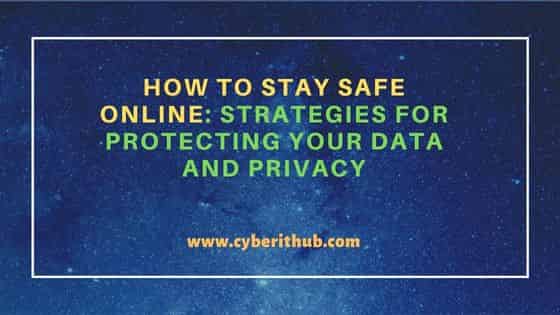Table of Contents
A guideline on how you can stay safe while browsing the internet. Why you should not share your personal data online? Why you should not click any unreliable links?
There is no denying that the internet is filled with some suspicious characters, but it doesn’t mean that you have to turn off your internet. Rather, the best thing that you can do is be cautious and follow the following strategies to keep you safe online. The following are some tips that can help you in protecting your privacy online, which can be valuable if you are interested in having a career in cybersecurity?
Avoid Sharing Your Personal Information
If you want to protect yourself while browsing the internet, then you should not share your personal information, including your address, social media account, financial information, passwords, etc. In addition, you should consider that identity theft is not the only risk that you have to face. You might be surprised that there are some information details that are riskier to share. For instance, you should avoid sharing your relationship since this could be used by hackers in guessing your password or figuring out the answers to your security questions. Also, anything that you post on social media will remain to exist online even after it has been deleted.
Use a VPN
When connecting to W-Fi, be sure to use a VPN so that you can securely connect your device. In this way, you can assure that nobody will be able to access your data or monitor your activities on the internet. This can help you in securing your connection at home or when you are using public Wi-Fi. Learn more about VPN uses for safety measures to get more out of your VPN.
Although you can have security with a VPN, unfortunately, it could also slow down your internet connection. The reason behind this is that VPN will route your data to another server to keep it secured.
Avoid Using Unsecured Public Wi-Fi Networks
As much as possible, try to avoid using unsecured public Wi-Fi network except if it is really necessary. If you can’t avoid using unsecured public Wi-Fi networks, then you should never log into your accounts or enter any of your financial or personal information. Most often, hackers will create fake Wi-Fi hotspots to attract web surfers. If somebody will log into the fake Wi-Fi, then they can see everything that you do on the internet.
To keep you safe when you are out of town, you could ask the barista for the name of their Wi-Fi network and the password.
Check Links Before Clicking Them
Before you start clicking any links on your email or social media, be sure that they can be trusted. You should also do the same when it comes to downloads. Most cybercriminals will trick you into downloading software or apps that contain malware. So, before you start downloading, be sure that it comes from a trusted source, whether you are downloading an app or a new game. If it looks suspicious, then you should simply avoid downloading it. Learn how to download in a secure manner.
To check if the link is safe, you can mouse over it to see a preview of the complete link. Verify if the preview link is the right site. You can check further if this is the correct site link by searching the company name on Google.
Also, if you receive an email that requests you to log in, then you should avoid clicking the login link in your email. Instead, just visit the official website and log in there. If you do not know the URL of the brand, then you can search it in Google. The key is, if you think that it seems vague, then you should not click it.
If you are unsure if the link is safe, then you can always search the company in Google to know its official site. Or if the site or an email requests you to log in to your bank account or any other accounts, then you can call them to verify if its authentic.
Websites That Start With https:// Are Safe
It is important to buy from websites that are secure. When logging in to websites, be sure that they start with https:// to keep you safe. If you want to view the balance of your savings or checking account, then before logging into the site, check if the top of the browser begins with https:// rather than http://. Most often, you can also see a padlock symbol on the website address. The “s” in https:// means that the website is secure. In other words, you can ensure that your data will be encrypted.

